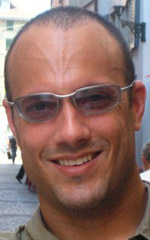Professor Curtis D. Carbonell
Curtis
D. Carbonell,
Ph.D., first grew interested in the intersection of science and the
humanities when he presented an M.A. thesis on Frederick Turner’s Genesis: an Epic
Poem about the terraforming of Mars.
Today, he writes about how the humanities disciplines need to maintain a
healthy
theoretical space in the face of increased influence by social and life
science thinkers. A
common current of investigation for him is the rise of technoscience as
a dominant force
that affects how human beings experience the world and that surfaces in
a variety of
literary texts.
From this perspective, he has published a
variety of
academic and online
popular articles, such as Gould as a Third Culture Thinker: Revising
Darwinism in Ecolga Online Journal (forthcoming);
Teaching “Humanity+” to Students;
The
Third Culture;
A Consilient Science and Humanities in Ian McEwan’s Enduring
Love;
Spandrels and
the Institution of Evolutionary Biology: Gould and the Third
Culture in The Journal of
Contemporary Thought, 29: Summer, 2009;
Evolutionary Literary
Studies:
The Failure
of Literary Darwinism; The Third Culture and the Problem of
the
Human in Essays in the
Philosophy of Humanism, 16:2: Fall-Winter, 2008; and
Taking off the
Gloves:
Dawkins and
the Root of All Evil? in Journal of Religion and Popular
Culture.
To further the investigation of how the humanities intersect with the
sciences — in
particular, the important conversations surrounding the emergence of the
transhuman
and posthuman — he is co-coordinating a conference Transforming
Human
Nature in
Science, Technology, and the Arts to be held at NYIT in Bahrain, October
2011. In addition,
in the last few years he has presented papers on a wide range of topics
from Literary
Darwinism, to Stephen Jay Gould as a Third Culture thinker, to Aldous
Huxley’s Brave
New World.
He currently is an Assistant Professor of English for New York Institute
of Technology (Bahrain) where he teaches a senior seminar on science
fiction and culture. He is currently preparing a paper that looks at how
theories in technoscience provide a reading of HBO’s critically
acclaimed program,
The Wire.
Visit his Facebook page and
his
LinkedIn profile.
Follow his
Twitter feed.





